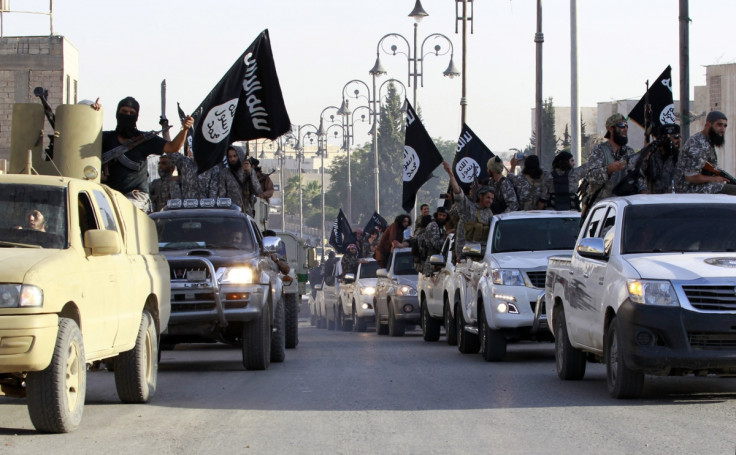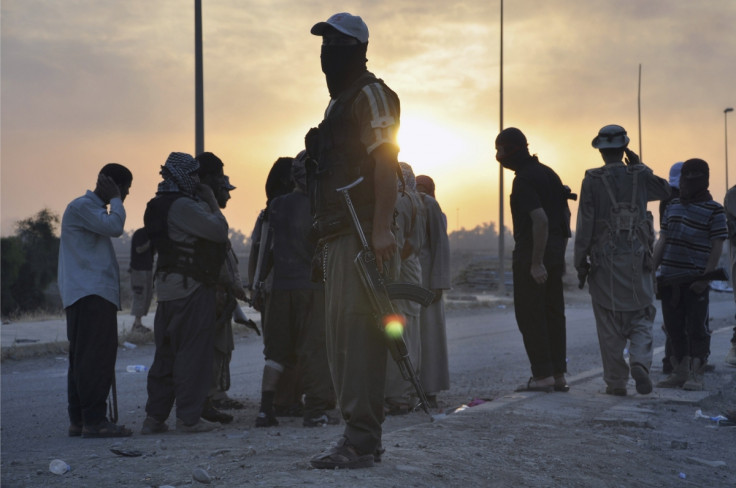Isis: Syrians must rise against Muslim fascists as France did against the Nazis

With France and its allies poised to respond to the deadly Paris attacks, it's time to contact and arm a nascent anti-IS resistance that could be key to defeating the self-proclaimed Caliphate. There are signs that at least part of the Sunni population inside IS-held territory, even those who might have cheered the group during its initial offensive in Syria and Iraq, are ready to form the core of a much-needed resistance movement. Some inside the very heart of IS territories are resisting, either by reporting on security operations and raids, or by taking arms against the group.
On a daily basis, activists from Raqqa and Mosul are giving us an insight into IS' rule of fear and are living proof of resistance even at the very heart of the Caliphate. And while we may be ignoring them, IS is not. Weeks ago in Turkey, an Isis militant, posing as a defector beheaded a member of Raqqa is Slaughtered Silently, an activist group that reports on IS activities in its self-proclaimed capital. There are other examples.
On 22 November, reports emerged that IS (Daesh) executed 12 social media activists that were reporting on the group's activities in its Iraqi stronghold of Mosul. A few days later, IS launched a campaign of arrests after local youths raised the flag of the Syrian revolution in the border town of Al Bukamal. Local residents responded by killing four IS members.
It's time for France, which was reminded so cruelly of the dangers of a totalitarian ideology, to look to its own history for the solution to the current fight against IS' nefarious ideology.
These examples are not limited to the Caliphate's heartland in Iraq and Syria. In another blatant failure to act against IS, Western powers stood idly by in August as IS militants in the Libyan city of Sirte crushed what could have been the beginning of an uprising against their presence in the country.
Public executions and beheadings were carried out against members of a local tribe who dared protest the killing of a local imam. This was also not the first time this occurred in Libya. A few months prior, following the crucifixion of three members of the same family in Derna, clashes erupted in the city and eventually led to the departure of IS after an Islamist brigade confronted and drove its members out of the city.
The fight in Derna gives broader insight into the group's weaknesses: As opposed to al-Qaeda, which has made significant effort to mix its ideology with those of local and nationalistic narratives, IS failed to build a strong and long-lasting connection with the local population it enslaves.
Several testimonies from local residents of IS's self-proclaimed capital of Raqqa have shed light on a city under "foreign occupation", where European and Arab fighters from all across the globe are living at the expense of the local population. Similar accounts are coming from IS' coastal capital of Sirte in Libya, where the group's leadership is comprised of Gulf nationals and a significant portion of its fighters are from Libya's neighbouring countries.
This is IS' Achilles heel. In its haste to construct a pan-national Caliphate encompassing a chaotic mix of nationalities, IS failed to build a connection to the land in which they're fighting. IS is a proto-state wrapped ideology that is trying – and failing – to forge its own population. And because we are obsessed with our own fears, we fail to see the refugees for what they are: the living proof that IS failed as the "defender of Sunnis", and a very concrete blow to IS' most precious asset, its own narrative.

In a series of videos and an article in IS' previous edition of its propaganda magazine, Dabiq, the group brought the spotlight on to its own concerns, warning of "the dangers of leaving Darul Islam [the land of Islam]", in reference to the Sunni refugees departing Syria. In retrospect, and in light of the debate and impact of the Paris attacks on both US and European policies toward these refugees IS so clearly despises, this warning now seems akin to a threat.
There is a reason for IS' obsession with refugees. Forget the oil, IS' most important wealth is tied to the number of souls it can influence and the number of people it can tax. IS knows that, for the Caliphate to succeed, it must be able to demonstrate its ability to fulfil the needs of its people. And there's nothing that chips away at this more than people who prefer to risk the dangers of emigration to Europe instead of the Caliphate
In that sense, dispatching more fighter jets just won't do the trick. It's time to stop acting upon the Pavlovian reflexes that IS knows too well. From the public execution of American journalist James Foley to the Paris attacks, the group's media strategy has always been to draw us [the West] deeper into Iraq and Syria.
From the mountains of northern Iraq, where mass graves of Yazidis were discovered, to the bars, restaurants, and stadium of Paris, IS wants to ensure that its enemies demand blood. By doing so, it intends to consolidate its grip over Sunni population forced to choose between the totalitarian and implacable rule of IS, or the very real possibility of being killed by the group's enemies, seeking revenge.
During the Second World War, a handful of French civilians, started a group dubbed the Résistance that helped guide the American air campaign, sabotage the German war effort, and, almost as importantly, served as a blatant reminder that the French population refused to placidly exist under Nazi occupation.
The French Résistance was the base off which the French state was rebuilt, despite the shame of occupation and French collaboration. It's time for France, which was reminded so cruelly of the dangers of a totalitarian ideology, to look to its own history for the solution to the current fight against IS's nefarious ideology: Time to build up the anti-IS Résistance.
Daesh – What's in a name?
Should we cease referring to the terrorist group that controls swathes of Iraq, Syria, Libya and Egypt's Sinai as Islamic State, Isis or Isil and begin using Daesh?
The term Daesh has become official terminology in Russia and France, where it was adopted as far back as September 2014, and has a major advantage in that IS fighters and leaders hate it. The word is an Arabic acronym of "al-Dawla al-Islamiya fi Iraq wa ash-Sham" – meaning the Islamic State of Iraq and al-Shams – but Daesh when spoken sounds similar to the Arabic words translating to "the sowers of discord" (Dahes) or "one who crushes underfoot" (Daes).
Due to Arabic wordplay, Daesh could be considered an insult. IS threatened "to cut the tongue of anyone who publicly used the acronym Daesh, instead of referring to the group by its full name".
Why Isis hates being called Daesh: What's the correct name for the world's most dangerous terrorists?
Michael Horowitz is a security analyst and head of business development for the Levantine Group.
© Copyright IBTimes 2025. All rights reserved.






















